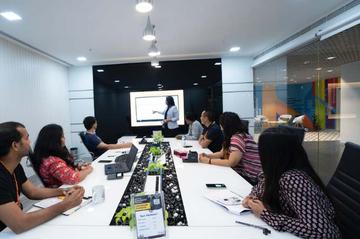How To Start Your Career in Learning and Development (L&D)
Wed 23 Apr 2025
Ever thought about building a career that’s all about helping others grow? That’s exactly what Learning and Development (L&D) is all about.
From designing training programmes to shaping the future of workplace learning, it’s a career path that blends strategy, creativity, and people skills - and it's growing fast.
If you're just starting out, considering a career change, or simply curious about what L&D roles involve, this guide is here to point you in the right direction.
Here, we’ll break down:
-
essential learning and development qualifications
-
must-have skills
-
typical job titles you’ll come across
-
how to get a job in learning and development
-
what kind of salary to expect
-
how your career can evolve over time.
So, if you're wondering how to get started in Learning and Development – keep reading!
What is learning and development?
Learning and Development (L&D) is all about helping individuals and teams improve their skills and knowledge to boost performance and success.
In our fast-paced and ever-evolving workplaces, L&D plays a really important role in keeping employees engaged and prepared for future challenges.
The role of L&D in organisations
L&D professionals are responsible for identifying skills gaps, designing training programmes, and ensuring that employees have access to the tools they need to thrive.
It’s a field that blends strategy, creativity, and people management.
Day-to-day tasks and responsibilities
Your typical L&D role might include:
-
Designing e-learning courses
-
Organising workshops
-
Creating learning materials
-
Providing coaching or mentorship.
It’s a dynamic job that can evolve as new technologies and methods are introduced.
How to get into learning and development with no experience
Did you know that you don’t need prior experience in L&D to get started? Lots of people make the switch from other roles and industries by using their existing skills and getting the right qualifications.
Making a career change into L&D
If you're transitioning from another field, it’s all about showcasing your transferable skills.
For instance, if you’ve worked in project management, you probably have some experience in organising, coordinating, and working with people - skills that are highly valued in L&D!
Transferable L&D skills from other sectors
Skills like communication, organisation, coaching, and problem-solving are crucial in L&D. You might find that your experience in teaching, HR, or management gives you a solid foundation to build on.
Entry-level roles and how to get experience in L&D
Look for entry-level positions like L&D Assistant or Training Coordinator. These roles will give you the chance to develop hands-on experience while learning from others in the field.
Volunteering or taking on projects that involve training or mentoring can also help you get some relevant experience in learning & development!
Qualifications you need for learning and development jobs
While you don’t necessarily need a degree to get into L&D, some qualifications can help you stand out.
Do you need a degree to work in L&D?
A degree isn’t always essential for learning & development roles, but it can be helpful if you're looking for a managerial or senior position.
A degree in education, human resources, psychology, or business can give you a solid foundation to start from.
Wondering what the best option is for you? Read our guide CIPD vs. HR degree.
Recommended learning & development qualifications
If you want to specialise in L&D, CIPD (Chartered Institute of Personnel and Development) qualifications are the most respected in the industry.
These courses are specifically designed to equip you with the skills and knowledge to excel in L&D roles.
If you’re after more flexibility and quality teaching, our accredited Learning & Development CIPD courses are a fantastic choice.
With MOL, our courses give you the freedom to learn at your own pace, making it so much easier to fit studies around your other commitments.
Skills employers look for in learning and development roles
To succeed in an L&D career, you’ll need a specific set of skills. These include communication, digital literacy, and coaching abilities.
Communication, coaching, and digital skills
L&D professionals must communicate clearly and be able to motivate and coach employees.
As organisations move towards digital learning, proficiency with learning management systems (LMS) and e-learning tools is essential.
Learning & development technology and trends
Make sure you get familiar with the latest L&D technologies, such as virtual classrooms, gamification, and microlearning platforms.
These tools are being used more and more to enhance the learning experience.
How to stand out from other candidates
To stand out in a learning and development job application, it’s so important to show your passion for people and their development!
Highlight any relevant experience you have (even if it’s not work experience) and show your eagerness to learn and adapt to new tools and methods.
Types of learning and development roles
One of the best parts of a career in learning & development is that it offers a variety of roles, each with different focuses.
Here are just a few!
L&D Assistant: A support role that helps manage training logistics and materials.
L&D Manager: Oversees the development and implementation of learning programmes.
Head of Learning: Leads the L&D department and drives strategic initiatives.
Some L&D professionals specialise in areas such as e-learning design or becoming an L&D consultant, giving organisations advice on how to improve their training and development efforts.
Learning and development roles often involve tasks like creating training programmes, managing LMS platforms, and making sure learning initiatives align with organisational goals.
How to get a job in learning and development
Now that you know more about L&D, here’s how to take the next step in your career.
-
Understand what L&D roles involve
Do your research and understand the specific responsibilities of different L&D roles. This will help you decide which role best fits your skills and interests.
-
Start with entry-level learning & development jobs
Entry-level positions are a great way to start building your career in L&D. Alternatively, if you already have experience in a related field (like teaching or HR), you can highlight those transferable skills.
-
Get relevant qualifications and skills
Investing in CIPD qualifications is one of the best ways to enhance your career in learning and development.
Not only will it make you more employable, but it will also give you the expertise and confidence to excel in L&D roles.
Here at MOL, our CIPD-accredited courses can be tailored to your career stage, from entry-level to senior positions.
-
Make sure your CV shows off your strengths
After all your hard work, don’t fall at the first job hurdle with a weak resume!
Be sure to create a CV that highlights your ability to work with people, communicate effectively, and solve problems – all skills which are highly valued by L&D employers.
-
Network and apply
Networking is important for any job search, so give yourself a strong start by attending L&D events, joining professional groups, and connecting with people who can help guide you in your career.
Remember, don’t be afraid to apply for entry-level roles – they're an excellent way to get your foot in the door!
Learning and development salary expectations
Like most industries, salaries in learning and development will vary depending on your experience, qualifications, and location.
Typical learning & development salaries
Entry-level salaries in L&D usually range between £20,000 and £25,000. These roles will usually involve you supporting more senior team members and getting hands-on experience.
Mid-level and senior L&D salaries
As you gain experience, you can expect to earn between £30,000 and £45,000, with managerial positions reaching upwards of £50,000.
Factors that affect your earning potential
Your earning potential will depend on factors like your qualifications, the industry you work in, and your experience level.
Career progression in learning and development
Learning and development offers a wide range of career paths with plenty of opportunities for growth.
As you gain experience, you can:
-
Move into senior roles – Progress from L&D Assistant to L&D Manager or Head of Learning
-
Specialise in a niche area – Focus on e-learning, coaching, or consultancy
-
Step into leadership – Manage larger teams and shape L&D strategy within organisations
-
Keep developing – Stay ahead by attending workshops, gaining new qualifications, and joining professional bodies like CIPD (Chartered Institute of Personnel and Development).
The world of L&D is always evolving, so continuing professional development and lifelong learning will always be key to unlocking long-term career success in the field.
Unlock your career in learning and development with MOL
If you’re aiming to get into a career in learning and development, a recognised CIPD qualification can give you a serious advantage.
MOL’s flexible, online learning and development courses are designed to fit around your life while giving you the skills and confidence to succeed.
Explore our courses and get enrolled to kickstart your new career today!

Learning & Development
Qualifications
We understand the L&D profession like no other training provider. That’s what makes our courses great.




